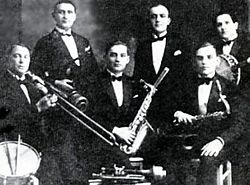- Artur Gold
-
Artur Gold (born March 17, 1897, Warsaw, died 1943 in Treblinka) was a Polish Jewish violinist and dance-music composer. He was the second son of Michał Gold, a musician in the Warsaw Opera; when Michał died an uncle took him to England, where he received his musical education.[1] He later returned to Warsaw and played there in various nightclubs. His closest collaborators were his brother Henryk and Jerzy Petersburski, with whom he arranged for his famous ensembles; they were among the most popular composers in interwar Poland and their many hits were sung through the whole country.[1] Gold ran an orchestra in the Qui Pro Quo theater (1922) and in the Warsaw cabaret Adria (1931–1939).
Some of his noted compositions were the foxtrot Gdy Petersburski razem z Goldem gra ("When Petersburski and Gold play together") (1926), the tango Gdy w ogrodzie botanicznym ("In the botanical garden"), Jesienne róże ("Autumn roses"), Nie odchodź ode mnie (Don't walk away from me), Nie wierzę ci, Jaśminy (Jasmine), Kwiaciarka z Barcelony (Flower girl from Barcelona), Oczy czarne (Black Eyes), Ostatni jeszcze, and others. Most of the texts were by Andrzej Włast.[1]
He also performed with English orchestras in the 1920s and recorded for Columbia records. In the 1930's he also recorded several albums for the "Odeon" phonograph company.
During World War II, Artur played with an orchestra in the Warsaw Ghetto. He was deported by the Germans from the Umschlagplatz to Treblinka extermination camp where he played for the Nazis in their casino and where he was murdered in 1943. According to recollections of some of the Treblinka survivors Gold might have been killed during the uprising at Treblinka which occurred on August 2, 1943.
The melody of his song Chodź na Pragę (Come to Praga) (1930) is currently played as a Hejnał of the Warsaw borough of Praga, each day at noon.
References
External links
Other death camps: Auschwitz-Birkenau · Bełżec · Chełmno · Jasenovac · Majdanek · Maly Trostenets · Sobibor Camp organizers Odilo Lotario Globocnik • Hermann Julius Höfle • Richard Wolfgang Thomalla • Erwin Hermann Lambert • Christian WirthCommandant Deputy commanders Heinrich Arthur Matthes • Karl Pötzinger • Theodor von EupenGas chamber executioners Fritz Schmidt • Gustav MünzbergerOther officers Max Biala • Paul Bredow • Herbert Floss • Erich Fritz Erhard Fuchs • Lorenz Hackenholt • Josef Hirtreiter • Otto Richard Horn • Kurt Küttner • Karl Emil Ludwig • Willy Mätzig • Willi Mentz • August Wilhelm Miete • Max Möller • Willi Post • Albert Franz Rum • Karl Schiffer • Otto Stadie • Ernst Stengelin • Franz SuchomelGuards Germans/Austrians:
Ukrainians: Ivan Demjanjuk • Feodor Fedorenko • Ivan Ivanovich Marchenko • Nikolay Yegorovich Shalayev • other Volksdeutsche and prisoners of war (90 to 120)
Latvians:Prominent victims Ernst Arndt • Yitzchok Breiter • Artur Gold • Ludwik Holcman • Janusz Korczak • Yechiel Lerer • Yitzchak Lowy • Simon Pullman • Natan Spigel • Lidia ZamenhofResistance and survivors Nazi occupation and organizations Planning, methods,
documents and evidenceWar crimes investigations and trials Treblinka TrialsRelated articles Categories:- 1897 births
- 1943 deaths
- Polish composers
- Polish violinists
- Polish Jews
- Warsaw Ghetto inmates
- Treblinka extermination camp victims
- Polish cabaret performers
- Jewish composers and songwriters in Europe
- Musicians who died in Nazi concentration camps
- Composers who died in Nazi concentration camps
- Jewish violinists
- People from Warsaw
- Polish civilians killed in World War II
Wikimedia Foundation. 2010.

